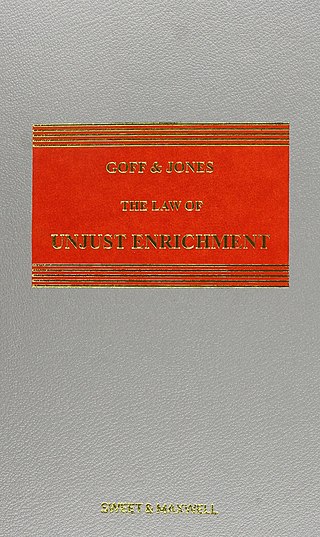Change of position is a defence to a claim in unjust enrichment which operates to reduce a defendant's liability to the extent to which his or her circumstances have changed as a consequence of an enrichment. [1]
Change of position is a defence to a claim in unjust enrichment which operates to reduce a defendant's liability to the extent to which his or her circumstances have changed as a consequence of an enrichment. [1]
The historical core of the law of unjust enrichment consists of the quasi-contractual actions of money had and received, money paid to the defendant's use, quantum meruit and quantum valebat. These personal common law actions generated an obligation on the part of the defendant to give restitution of a gain acquired at the expense of the plaintiff. This liability was strict and independent of any wrongdoing on the part of the recipient. Change of position provides a defence to a defendant where it would be inequitable to compel him or her to make restitution. The defence was recognised as part of the English law of unjust enrichment by Lord Goff in Lipkin Gorman v Karpnale Ltd [1991] 2 AC 548.
A quasi-contract is a fictional contract recognised by a court. The notion of a quasi-contract can be traced to Roman law and is still a concept used in some modern legal systems. Quasi contract laws have been deduced from the Latin statement "Nemo debet locupletari ex aliena iactura", which proclaims that no one should grow rich out of another person's loss. It was one of the central doctrines of Roman law.
The forms of action were the different procedures by which a legal claim could be made during much of the history of the English common law. Depending on the court, a plaintiff would purchase a writ in Chancery which would set in motion a series of events eventually leading to a trial in one of the medieval common law courts. Each writ entailed a different set of procedures and remedies which together amounted to the "form of action".
Restitution and unjust enrichment is the field of law relating to gains-based recovery. In contrast with damages, restitution is a claim or remedy requiring a defendant to give up benefits wrongfully obtained. Liability for restitution is primarily governed by the "principle of unjust enrichment": A person who has been unjustly enriched at the expense of another is required to make restitution.
Assumpsit, or more fully, action in assumpsit, was a form of action at common law used to enforce what are now called obligations arising in tort and contract; and in some common law jurisdictions, unjust enrichment. The origins of the action can be traced to the 14th century, when litigants seeking justice in the royal courts turned from the writs of covenant and debt to the trespass on the case.
Failure of consideration is a technical legal term referring to situations in which one person confers a benefit upon another upon some condition or basis ("consideration") which fails to materialise or subsist. It is also referred to as "failure of basis". It is an 'unjust factor' for the purposes of the law of unjust enrichment. Where there is a "total failure of consideration" the claimant can seek restitution of the benefit by bringing an action in unjust enrichment against the defendant. Historically speaking, this was as a quasi-contractual claim known as an action for money had and received to the plaintiff's use for a consideration that wholly failed. The orthodox view is that it is necessary for any relevant contract to be ineffective, for example because it is discharged for breach, void ab initio or frustrated. However, it will be available on a subsisting contract where it does not undermine the contractual allocation of risk.
The English law of unjust enrichment is part of the English law of obligations, along with the law of contract, tort, and trusts. The law of unjust enrichment deals with circumstances in which one person is required to make restitution of a benefit acquired at the expense of another in circumstances which are unjust.

Lipkin Gorman v Karpnale Ltd[1988] UKHL 12 is a foundational English unjust enrichment case. The House of Lords unanimously established that the basis of an action for money had and received is the principle of unjust enrichment, and that an award of restitution is subject to a defence of change of position. This secured unjust enrichment as the third pillar in English law of the law of obligations, along with contract and tort. It has been called a landmark decision.

Philip Collins Ltd v Davis [2000] 3 All ER 808 is an English unjust enrichment case, an example of a restitution claim and the change of position defence.
The English law of Restitution is the law of gain-based recovery. Its precise scope and underlying principles remain a matter of significant academic and judicial controversy. Broadly speaking, the law of restitution concerns actions in which one person claims an entitlement in respect of a gain acquired by another, rather than compensation for a loss.
BP Exploration Co (Libya) v Hunt [1983] 2 AC 352 is an English contract and unjust enrichment case, concerning the frustration of an agreement.

Westdeutsche Landesbank Girozentrale v Islington LBC[1996] UKHL 12, [1996] AC 669 is a leading English trusts law case concerning the circumstances under which a resulting trust arises. It held that such a trust must be intended, or must be able to be presumed to have been intended. In the view of the majority of the House of Lords, presumed intention to reflect what is conscionable underlies all resulting and constructive trusts.

Foskett v McKeown[2000] UKHL 29 is a leading case on the English law of trusts, concerning tracing and the availability of proprietary relief following a breach of trust.

El Ajou v Dollar Land Holdings plc[1993] EWCA Civ 4 is an English trusts law case concerning tracing and receipt of property in breach of trust.
An action for money had and received to the plaintiff's use is the name for a common law claim derived from the form of action known as indebitatus assumpsit. The action enabled one person to recover money which has been received by another: for example, where a plaintiff paid money to the defendant while labouring under a mistake of fact or where there was a total failure of consideration. The action was a personal action only available in respect of money, rather than other benefits. Where the benefit received by the defendant was services or goods, the appropriate action was a quantum meruit or a quantum valebant, respectively.

Pavey & Matthews Pty Ltd v Paul, is a leading Australian case concerning unjust enrichment, and an award for restitution based on quantum meruit.

McDonald v Coys of Kensington (Sales) Ltd [2004] EWCA Civ 47 is an English unjust enrichment law case, concerning the nature of an enrichment.
Relfo Ltd v Varsani [2014] EWCA Civ 360 is an English unjust enrichment law case, concerning to what extent enrichment of the defendant must be at the expense of the claimant.

The local authorities swaps litigation refers to a series of cases during the 1990s under English law relating to interest rate swap transactions entered into between banks and local authorities. The House of Lords ruled that such transactions were unlawful. As a result of the decision over 200 separate actions were filed as hundreds of interest rate swap contracts had to be unwound by the courts at great expense.

Barclays Bank Ltd v W J Simms, Son and Cooke (Southern) Ltd [1980] 1 QB 677, [1979] 3 All ER 522 was a decision of the High Court of Justice relating to the recovery of a payment mistakenly made by a bank after the customer had countermanded the cheque.

Goff and Jones on the Law of Unjust Enrichment is the leading authoritative English law textbook on restitution and unjust enrichment. First written by Robert Goff and Gareth Jones, it is presently in its tenth edition. It is published by Sweet & Maxwell and forms part of the Common Law Library.